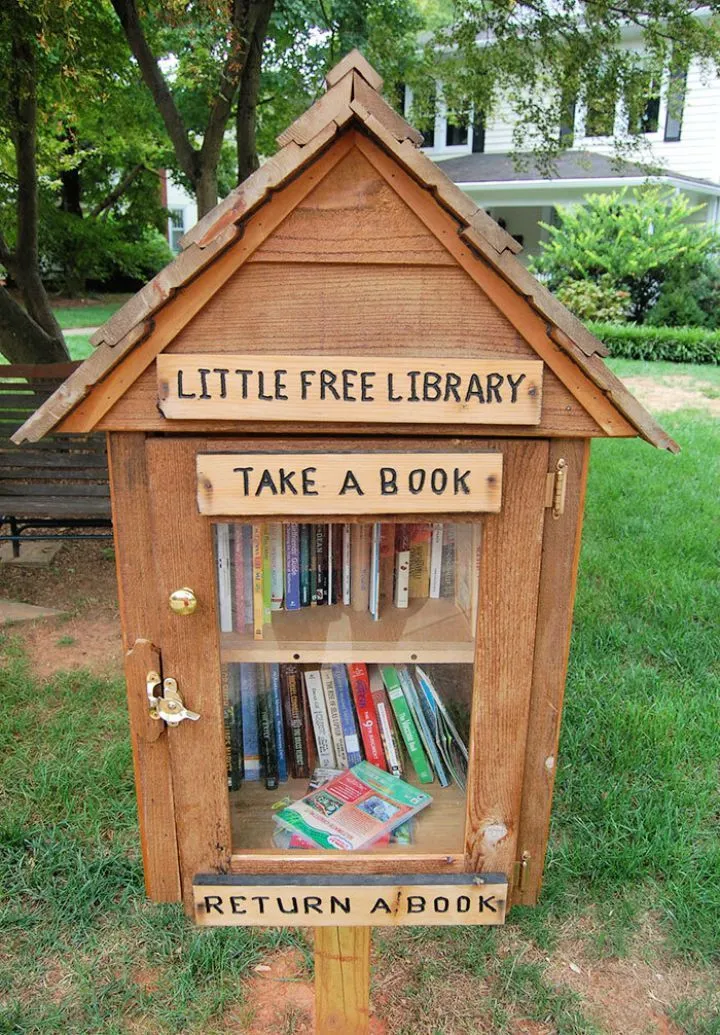Community centers and libraries are needed and wonderful, but here are some other ideas I love to see:

“Free” cupboards From free little libraries, to food pantries, to tool sheds, and more, these variations on free community cupboards are starting to pop up around the world, and I adore them. Essentially, if you have something you no longer want, you can put it in one of these themed community cupboards so that someone else can use it. Some people are even managing to convince their apartment buildings to put one in their lobby.




Image 1 | Image 2 | Image 3 | Image 4

Community Vending Machines
If someone opened a vending machine where people could rent a space inside, it could be great for those who want to sell something, but can’t afford to rent a building. Instead, you can rent that spot inside, and test the market for what you are selling for a lot less risk. Even if you rent a whole unit, it could still be less than the cost of renting a full building with staff.
For an example of this in action, vending machines are being used by farmers who are buying them themselves, so that they can make back more profit than what happens in the store. Due to the demand, there are now farmer-specific machines to buy: such as ones just for eggs
“For every dollar we spend on food, only about 16 cents goes to the farmer. ” Tracie McMillan
While I do understand this brings up the whole “what about store workers” topic again, this system is nothing new for farmers. In many farming communities, you will come across a “honour code” stand, where the eggs or whatever else is at the end of the property, and they are trusting you to leave the correct amount of money for what you take. The vending machines do the same thing, but in a more secure way for the farmers.
Also, remember: the people most utilizing these systems are the ones who could not handle the cost or volume needed to have their products in a store.
So, in my opinion, vending machines could be a great stepping-stone for small businesses if more non-brand specific units were available.




Image 1 | Image 2 | Image 3 | Image 4

Swap Meets
Swap: If you swap something with someone, you give it to them and receive a different thing in exchange. Collins
Many people today are focused on being hyper-independent; this, however, is not how life has always been for everyone.
Have you ever heard of the term “barn raising?” Barn raisings (aka a raising bee) was when a whole community — especially in 18th-19th century North America — would get together to build a barn or other structure. With so many hands at the ready, they could build an entire barn in a day.
No one would be paid for their work, and the whole community was expected to help. Often, finishing would be celebrated with a feast and dance.
The idea of this is that you help your neighbor with the knowledge that you may need that help in the future.
Instead of taking on every task yourself, you lean on a community to take on some of the load. Here are some examples of how some people are working on this:
🌱 Seeds and Seedling Swaps 🌱
Some communities organize seed swaps, where you have a gathering for people to exchange seeds. This is a great way to swap something you have a lot of for something you have never tried before.
This system is particularly helpful for people who seed save from the previous harvest.
Can’t go with the community option? There are online seed exchanges as well.
Note: in some places, this is illegal. For example, in some of the USA states, patents are held on the seeds themselves. As well as that, there are also laws “intended to protect farmers” from weeds. Some people host these events anyways, while lobbying their local governments to make changes.
🍅 Harvest Exchanges / Crop Swaps / Food Swaps 🍅
While seed swaps tend to happen before the growing season, harvest exchanges happen during harvest times. By then, you will hopefully have produce of some kind from your garden, and if you have extra, you can exchange it with the produce of someone else. For example, if you grow tomatoes, you could leave with some carrots and apples.
This does not have to be on a large scale, either. You could set up a plan with friends where you each grow something different, then plan to swap at the end of the season.
There are also online options f or this as well.
Some of these also expand into finished goods; such as baked food, canned foods, and so on. These are called “Community Food Swaps.” There is are online directories for these.
https://youtu.be/bAmD2VAFSos https://youtu.be/NtVnaN2Yw0Y
👚Clothing Swaps 👚
I hope you are getting the idea by now, but just in case, people gather, and exchange clothes that no longer fit or no longer match their style, for clothes they do need.
Putting it simply, the events have tables (organized by clothing type and size) for you to put your clothing onto. You can go to any table, and grab the clothes you need.
If there are any clothes not claimed by the end of the event, they can be donated.
🧠 Knowledge Swaps 🧠
If you have a skill of some kind, you may be able to swap it for the knowledge someone has on a different subject. For example, if you know how to fix jewelry, that might be worth trading for someone who knows how to mend clothing.
For these, you literally exchange the skills by teaching the other person. Any skill you have, even holding chopsticks properly, could very well be a skill someone wants to learn, so do not doubt yourself.
🛠 Work Swaps 🛠
Just as it sounds: you exchange a job for a job. For example, let’s say you are good at graphics design but need a sink fixed; you could give a plumber the logo they need for marketing, while they repair your sink.

